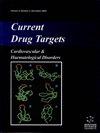对用于治疗乳腺癌的植物大分子和新方法的最新认识
IF 2.5
4区 医学
Q2 PHARMACOLOGY & PHARMACY
引用次数: 0
摘要
乳腺癌是一种普遍存在的疾病,在全球范围内,因癌症而死亡的女性人数比其他任何癌症类型都要多。患有雌激素依赖型、初期转移性乳腺癌的女性通常会接受手术、放疗和化疗。她们还可能接受更专业的治疗,如他莫昔芬或芳香化酶抑制剂(阿那曲唑或来曲唑)。世界卫生组织在 2012 年报告称,到 2030 年,乳腺癌将在全球范围内更为常见。有几种植物化学物质,如异黄酮、香豆素、木酚素和前黄酮苷。研究表明,异黄酮能防止乳腺癌扩散并引发细胞凋亡。将配方良好的植物化学物质纳米颗粒或其他新型给药剂与目前公认的内分泌疗法和/或传统化疗结合起来,就有可能针对转移性乳腺癌中的BCs进行治疗。植物成分可对细胞信号、细胞周期调节、氧化应激作用和炎症产生积极影响。它们能够改变非编码 RNA,防止癌细胞的增殖和再生。新方法的出现有助于提高疾病的靶向性、安全性、有效性和疗效。目前的文献有助于了解现有的药物,即植物成分或新型给药方式,如纳米颗粒、微球、胶束、脂质体和新体。这些文献来自 PubMed、Google Scholar、SciFinder 或其他互联网网站。本文章由计算机程序翻译,如有差异,请以英文原文为准。
An Updated Insight into Phytomolecules and Novel Approaches used in the Management of Breast Cancer
Breast cancer is a widespread condition that kills more women from cancer-related causes than any other type of cancer globally. Women who have estrogen-dependent, initial metastatic breast cancer frequently receive treatment with surgery, radiation therapy, and chemotherapy. They may also get more specialized treatments like tamoxifen or aromatase inhibitors (anastrozole or letrozole). The World Health Organisation reported in 2012 that by 2030, breast cancer will be more common worldwide. There are several phytochemicals, such as isoflavones, coumestans, lignans, and prenylflavonoides. Isoflavones have been shown in studies to prevent the spread of breast cancer and to trigger apoptosis. Targeting BCs in metastatic breast cancer may be made possible by combining well-formulated phytochemicals in nanoparticles or other novel drug delivery agents with currently accepted endocrine and/or conventional chemotherapies. Cell signaling, regulation of cell cycles, oxidative stress action, and inflammation could be positively impacted by phytoconstituents. They have the ability to alter non-coding RNAs, to prevent the proliferation and regeneration of cancer cells. The availability of novel approaches helps in disease targeting, safety, effectiveness and efficacy. The current literature helps to know the available drugs i.e. phytoconstituents or novel drug delivery like nanoparticle, microsphere, micelles, liposomes and neosomes. The literature has been taken from PubMed, Google Scholar, SciFinder, or other internet sites.
求助全文
通过发布文献求助,成功后即可免费获取论文全文。
去求助
来源期刊

Current drug targets
医学-药学
CiteScore
6.20
自引率
0.00%
发文量
127
审稿时长
3-8 weeks
期刊介绍:
Current Drug Targets aims to cover the latest and most outstanding developments on the medicinal chemistry and pharmacology of molecular drug targets e.g. disease specific proteins, receptors, enzymes, genes.
Current Drug Targets publishes guest edited thematic issues written by leaders in the field covering a range of current topics of drug targets. The journal also accepts for publication mini- & full-length review articles and drug clinical trial studies.
As the discovery, identification, characterization and validation of novel human drug targets for drug discovery continues to grow; this journal is essential reading for all pharmaceutical scientists involved in drug discovery and development.
 求助内容:
求助内容: 应助结果提醒方式:
应助结果提醒方式:


